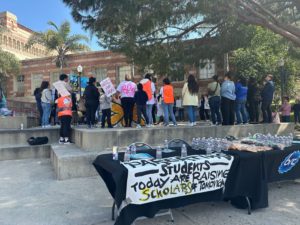This post was updated June 8 at 8:00 p.m.
Each year, thousands of graduates receive their degrees at UCLA. In addition to being students, some graduates hold another role – parent.
The American Council on Education defines student parents as students enrolled in a degree or certificate program who have at least one child or dependent. Student parents experience stress during their time in college as they balance the responsibilities of parenthood while being a student, according to a study published in the Journal of Student Affairs Research and Practice.
According to a 2023 report published by ACE, 18% of current undergraduate students at universities nationwide are student parents. Despite comprising a sizable percentage of the collegiate population, the report found that universities and policymakers have a poor understanding of student parents and their experiences.
Nadia Fadaei, a fourth-year gender studies student and parent of an eight-year-old and a four-year-old, said in a written statement that she has felt inadequate awareness of her needs as a student parent at UCLA.
“One of the hardest parts has been the lack of infrastructure that recognizes the needs of student-parents,” she said in the statement. “Things like class schedules not aligning with childcare, lack of family-friendly study spaces, or even the absence of drop-in childcare during finals week can make us feel invisible,” she added.
The same ACE report found that the lack of structural support for student parents leads to lower degree acquisition rates for student parents compared to nonparenting peers. According to a 2021 UC Davis study, only 37% of student parents received a bachelor’s degree within six years, compared to 60% of nonparenting college students.
As a result, over 50% of student parents drop out of college before graduation nationally, according to CalMatters.
Fadaei added in the statement that she almost considered taking an academic leave or dropping out because of UCLA’s limited institutional assistance, particularly the lack of affordable child care options and the assumptions about her flexibility as a mother and a student.
As Fadaei prepares to graduate, she said accessibility issues around graduation forced her to be selective in deciding which events to attend. She added that she has decided not to participate in the College of Letters and Science’s commencement because of concerns over time commitments, limited seating and daycare logistics.
“A lot of events and resources are planned with the assumption that students are flexible,” she added.
UCLA Media Relations did not respond in time to a request for comment about accommodations provided to students with dependents
Fadaei said she turns to on-campus resources, such as student groups like Students with Dependents, to find a community more accepting of her identity as a student parent. SwD, in partnership with Bruin Parenting Scholars – another campus organization supporting student parents – is hosting its own graduation ceremony exclusively for student parents.
In fact, a 2019 report by the Los Angeles Times found that on-campus resource programs can help boost semester completion and degree attainment rates for student parents. At schools that offer services such as counseling, food pantries and child-friendly play spaces, student parents who used these resources were 12% more likely to complete their semester than those who did not.
At UCLA, parenting students similarly find on-campus programs to be a useful resource in their degree completion.
Cecil Hatchett, a fourth-year psychology student, is graduating and is also the father of a graduating UCLA student. He said he has felt supported by on-campus organizations such as the Academic Advancement Program in his degree acquisition.
Hatchett said AAP has helped keep him on track with his graduation requirements to ensure he can walk in the spring. He also added that his professors and teaching assistants have been very helpful in supporting him through his classes.
Fadaei, however, said she is looking for more institutional forms of support.
Susan Swarts, the administrative director of Data X, a UCLA data science collection initiative, said the dispersed population of student parents, because of many living off campus, presents challenges for universities in developing comprehensive and centralized support systems.
For example, while UCLA tries to offer remote classes as an option for students, Fadaei said the scheduling of these classes is inconsistent and does not take into account the busy schedules of parenting students.
Remote access to classes is an option that UCLA provides through the Center for Accessible Education, but according to the center’s website, students must submit a Verification of Disability form, thus making student parents without disabilities ineligible for CAE accommodations.
While academic institutions may struggle to assist student parents, government programs are working to fill the gaps in the university’s support system for student parents.
In September 2024, California passed Assembly Bill 2548, also known as the Greater Accessibility, Information, Notice, and Support (GAINS) for Student Parents Act. This law mandates that all public colleges and universities in California establish better data collection on students, parents and their needs by the 2026-2027 school year. Co-sponsors of the GAINS for Student Parents Act believe better data will allow financial institutions to expand student parents’ access to financial aid, according to the California Alliance for Student Parent Access.
Until the GAINS for Student Parents Act is fully implemented, currently federally funded programs such as the Child Care Access Means Parents in School program are subsidizing child care at colleges and universities for student parents, according to the United States Department of Education. Fadaei said she accessed CCAMPIS resources to cover her childcare costs with the help of SwD.
Looking forward beyond graduation, Fadaei and Hatchett express mixed emotions about graduating.
Hatchett said he is grateful for his peers, faculty allies and family members, who have supported him throughout his collegiate experience.
“They look at me like a fellow student and they treat me as such, but they also have a place for me,” Hatchett said. “They admire me, and I feel that, and I love that. It makes me want to accomplish more goals.”
Fadaei said in the statement that leaving college means entering a world with fewer support systems and safety nets, but she said she hopes to use her degree and experience to advocate for other student parents and marginalized communities.
However, despite the challenges student parents face, their graduation has long-term generational implications for their families. Research conducted by Lamar University in 2021 has found a positive correlation between parental and child degree attainment; students whose parents completed a degree are more likely to attend and graduate from college.
Therefore, Swarts believes it is important to encourage all aspiring individuals with or without children to attend college.
“I think it’s in everyone’s interest to be able to educate as many people as we can who want to be educated. … People with kids are part of that,” she said.





Comments are closed.